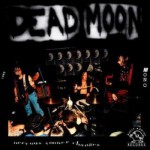 Dead Moon
Dead Moon
Nervous Sooner Changes
Tombstone Records
You know, they say you can’t teach an old dog new tricks, but in the case of Dead Moon, these old dogs have a few new tricks up their sleeves. Oh don’t worry, it’s not like they’ve added a synth player and gone New Age or anything. This is still the same old tough dog you’ve come to expect of the Moonies. But after all this time and all these recordings, one would not expect the band to improve or even change at all.
But years of world touring have hardened the band into a well-oiled machine. The little quirks that made them special are still in place, the machine still leaks a little. But that’s only because it’s often gotten overheated from being driven so hard over the years. The bottom line is that Dead Moon rock. Every nut and bolt.
From the very first track, “Diamond In The Rough,” you can hear the subtle changes that have evolved within the band. For one thing the rhythm section of Toody Cole on bass and Andrew Loomis on drums has tightened up immeasurably. Who could have anticipated that? It’s a three-chord rocker, typical of Fred Cole. His urgent wailing vocals seem familiar enough. But wait. Is that Toody trading vocal lines with Fred? In the past, there would have been no question as to the singer’s identity. But here again, Toody seems to have turned a musical corner. Her voice sounds exactly like Fred’s.
Check out Toody’s cool bass solo on “Say It Isn’t So.” Melodic and well executed. Tightness was never Dead Moon’s forté in the past, but it’s here on this track. Loomis slams out the verses in straight four, but adds a nervous surf-beat to the chorus that lends a lot of punch to the presentation.
Check out the ballad “I Won’t Be The One” for a clearer example of the gusto Toody has suddenly mustered for her vocal approach. Behind Andrew’s ticking rimshots and Fred’s chiming guitar, she belts out a mournful song with passion and élan. And she sounds like a female version of Fred. I guess that’s to be expected. How long have the Coles been married? Like about fifty years or so. And this song speaks to the bond of that alliance in a touching way.
“You Can’t Let Go” is a rock anthem of the highest order, telling the story of what it’s like to have a dream; and to pursue it beyond hope of any success. Once again, Toody contributes solid back-up vocals to Fred’s lead. “Psychodelic Nightmare” hearkens to the early days of punk, when the Sonics first sang “She’s A Witch” and “Psycho.” Fred shrieks like a banshee, wailing a curse through a chemical graveyard. His moaning guitar solo, a writhing snake, coils around the lower strings, fangs extended, poised to strike.
With its offhand reference to the chord progression of “House Of The Rising Sun,” “Somewhere Far Away,” unravels in a similar way— the tale of an erstwhile ne’er-do-well searching for hope in a hopeless world. The chunky chords of “I’m Not Afraid,” reminiscent of JJ Cale’s “Cocaine,” trip across Loomis’ tasty snare and kick work, creating a tough scenario for Fred’s fearless vocal. Windows Of Time” conjures up memories of several early Stones songs, “As Time Goes By” and “Wild Horses,” the foremost among them.
Logically, one would think that perhaps the moment had past for Dead Moon. But Fred Cole’s talent for songwriting, and the band’s obvious commitment to improving their sound, leaves the door of possibility wide open for them. Perhaps their time is now. This recording proves that it’s never too late for anyone who still has fire in the heart, and courage of convictions. Go Dead Moon! Rage. Rage until the dying of the day.
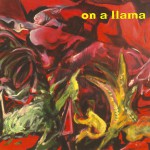 On A Llama
On A Llama
On A Llama
Self-Produced
Having reviewed the advance tracks a few months back, one would think there is little more to say for this brilliant initial effort, by this dazzling trio. But having listened to these songs every day for the past few months. I have come to respect lead singer/ bassist Lea Krueger’s songwriting craftsmanship even more.
Some of these songs will not leave the mind. They stick like honey to every surface. And with the now-finished package at hand, come the printed lyrics. These words expose Lea as more than a songwriter. She is a real poet.
Oh, the hit songs are here. “Mortify” lodges in the mind like a lump in the throat, until guitarist Greg Kirkelie thunders in like a powerchord Heimlich maneuver. And the galloping “Meredith” stampedes across the musical horizon like a herd of restless horses.
Kirkelie furnishes the Cobanian riffage over Kevin Rankin’s sure drumwork, as Lea coos through the verses and erupts in the choruses of “Can’t Be You.” The touching ballad “Threnody” ( it’s an ode-like dirge, a lamentation for the dead— ye dictionary-phobes), beckons heaven in Lea’s angelic voice. Kirkelie’s haunting guitar washes and the soaring splendor of the verses recall the Cocteau Twins at their best. Rankin’s imaginative approach to the percussion allows the song the space to breathe. And the tender chorus is heartbreakingly pretty. But a perusal of the lyrics uncovers an even deeper level to the song. It reveals the sad tale of a suicide— “I know this boy/maniacally poetic/I loved this boy/tragically prophetic/I wept alone for years/ chained to anguish/ Where no one would fall/ Where no one’s so foolish/And if he goes, we’ll all go soon.
Other ballads like “Pumpkin” and “I’m Not Going Anywhere,” secure Lea’s ability with the form. These are great songs, each and every one. Not a bad one among the fourteen presented.
“Rosaline illuminates another side to Lea’s poet’s eye. “Pull God’s weed from his meadow/And put them in your hair/Find shelter in the ghetto/Maybe Fate won’t find you there, Rosaline.” In “Dancer,” Lea questions humanity. “Where are the men who cry/Tears for all the lesser men and women?” And with “Looks Like Jesus” she uncovers her own doubts. “I’d hate so much if he consumed me/ All my time would be wasted/ All my time would be stolen/I’d hate him so much if he continues/ All my thoughts would be public/ All my thoughts would be morbid/ I’d love a loser, but I can’t afford it.”
And finally, there is the splendid passage in “Spill,” which echoes the piquant beauty of Emily Dickenson– “I’m not a person, I guess/Since I’ve been claiming I’m anything— like a tree/ The tales wrestled from my psyche/Aren’t anything to feel and they’re free.”
This is profound work. Few bands in the universe can claim to muster such abilities into one cohesive unit. On A Llama do it with such ease, yet with such passion. Powerful, yet restrained. Sensitive, yet tough. This is a visionary band with a real message to impart. There aren’t many of those around anymore.
 Ozone Park
Ozone Park
The Artist
Magick Records.
Here’s a band new to the scene who seem quite capable of generating a few waves of their own. The focus here is on the abundant vocal prowess of Pamela Sayer and the pristine acoustic guitar work of Paul Hamilton. Pamela calls to mind Annie Lennox at times and Jonatha Brooke at others. The songwriting is sort of unusual, but it can grow on you after a while.
The same holds true for the productions, which depend almost exclusively on Hamilton’s shimmeringly impeccable fretwork. Bassist Jimmy Lineham provides sterling support, as with his clever efforts on “Daizey Chain” and “Drummer Girl.”
The songs themselves are fairly conventional, with odd twists that usually prevent them from becoming too terribly predictable. Pamela’s voice is the centerpiece on “The Artist.” Her full, rich contralto weaves around the filigree lines Hamilton embroiders. A coat of many colors. “Inspired” wanders toward a melodic point through the verses, before falling into a comely chorus.
“Claudia” benefits from light washes of simple synth string washes and Sayer’s emotional interpretation of the song. But for all the power of her vocal instrument, the melody here, as in other songs, seems repetitive and not particularly challenging to her apparent capabilities. “Shotgun Blues” utilizes a familiar country/folk template to good effect on this animated jig.
On “Deliverance,” Hamilton sort of turns the riff of the previous song upside down, mirroring Peter Green’s (of early Fleetwood Mac) “Oh Well,” or Steve Stills’ “Black Queen” for the lightning speed of his execution. Pamela’s vocal approach here fits in well with the 4 Non-Blondesish arrangement. A good song.
Drummer Jeff Langford shines on “Truth,” with well-placed syncopated snare work. A sense of real drama swirls around the arrangement. Up to the test, Sayer turns in one of her better performances.
Ozone Park show a great deal of assurance and facility, though they are not fully developed as songwriters. The arrangements, while always eloquently rendered, often lack imagination as to their structure. All eight songs presented begin the same way: with Hamilton outlining the introduction on acoustic guitar, before the rest of the ensemble joins in. By altering this habit, the band would steer clear of the of the accusation that every song sounds the same. An occasional electric guitar wouldn’t hurt the spectrometer reading either.
Similarly, it is my impression that these songs are written in exactly the same way every time. Paul comes up with a chord progression, over which Pamela floats a melody. But a melody is more than a single note repeated over pretty chord movements.
If that scenario is indeed the case, Pamela would do well to discover what intervals mean. For while it’s true that even a three note melody can be pretty if constructed just so and sung with panache, huge possibilities arise when one explores the realms of fourths, fifths, sixths and beyond, into the nether regions. This is not a fruitless area of study, and mastery, for any aspiring songwriter to explore.
Some songs succeed. These are talented musicians who believe in their abilities. And not without reason. “The Artist,” “Deliverance” and “Truth” are songs that lend testament to their faculties. With just a little concentrated effort, Ozone Park could make a mark in the business of music.
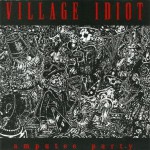 Village Idiot
Village Idiot
Amputee Party
Ash Records
If they’re not careful, Village Idiot will have to change their name. In days past, it seemed all too appropriate. But now Idiot Savant would seem to be the very least that they warrant. Take keyboard flavors of EMF, mix in a dollop of the Beastie Boys, a cup and a half of Primus, a pinch of NIN and add a dash of early Chili Peppers and you’ve got the new, relentless stew that is VI.
Kevin Orkian’s strategic keyboard salvos add an unusual texture to the brass-knuckled punches the Idiots deliver. Only the convulsive “Trapped” fails to utilize his subtle services. And only “G-Force Face,” with it’s unearthly vocal and strutting rhythm fails to reach one-hundred and sixty beats a minute.
Every song bears witness to the band’s dedication to the execution of their sound— as morbid as it may be. Bassist Grave Rob and drummer Coco are as connected as a needle in a vein. And guitarist 2 Pat distorts around the perimeter like a second personality, agitating and manipulating the sonic mind set. They’re a very tight band.
Lead singer, Fresh Prince of Darkness injects the necessary bravado and spleen to properly underscore the vortiginous volatility of cheerless ditties such as “Human Shield,” “Pistol Whipped,” “Beaten Bloody Pulp,” and “Stomach Pump.” Yes indeed, life is good.
Be that as it may, Village Idiot’s sound is unrelentingly fearsome— dark and bile-drenched, like a polyp removed from the liver of Hell. Yum yum. In lighter moments, merely a cancerous tumor cleared from the throat of Satan. Ahem. Loads of fun.
It is beyond me what motivates anyone to assemble such a tall mountain of shit. Village Idiot’s devotion to the cause is undeniable. With the clear talent they exhibit, they could do anything they choose. This is their choice.
The world is a pretty crummy place and there is pain and misery enough to go around. If Village Idiot’s goal is to add to the general hopelessness of Mankind— then, regretfully, they have succeeded miserably.
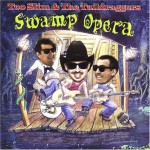 Too Slim and the Taildraggers
Too Slim and the Taildraggers
Swamp Opera
Burnside Records
Conversely, Too Slim and the Taildraggers approach the human dilemma with a far more simplistic approach— “Drinkin’ Rye” and eatin’ “Snakehead Soup.” Their approach to roadhouse blues and rock is elemental and far from virtuosic. But even though they don’t have the best stuff, they mix up their pitches and hit the corners often enough to keep this Spokane-based trio well in the game.
Guest Charlie Musselwhite lends his sugary harp to the Canned Heatish gas tank of “One More Gallon Of Gasoline.” Frank Ruffolo’s accordion dresses up the Zydeco flavored title cut. And Frank Pugh lends thick Hammond clusters to the bluesy instrumental “Blue Guitar;” blustery rumble to the soul flavored “Chicken Shake;” and smoky ambiance to the slow, smoldering fire of “She’s Not Comin’ Back.”
It is with “She’s Not Comin’ Back” that Tim ‘Too Slim” Langford’s strengths are brought into clear relief. Not blessed with the world’s greatest voice, Slim still adds the component heart to his presentation. And while he is not the greatest guitar player in the world, his impassioned lead solo in the middle break sheds real tears.
Slim pulls off some tasty slidework on the instrumental “Drinkin’ Rye.” The sparse accompaniment provided by bassist Tom Brimm and drummer John Cage allows enough space for the nuances of Slims solo to shine through. The instrumental, “Snakehead Soup,” is a droogie twang-bar rumble. Sort of an upside down, speeded up “Apache,” supplemented by Cage’s deft tom work. Slim shows off his masterful slide technique on “Carryin’ On.”
The slow shuffle of “My Baby Needs A New Pair Of Shoes” showcases the voogum of Slim’s vibrator-laden swamp guitar. Brimm’s trotting bassline provides the momentum over Cage’s laid-back drums. Meanwhile, Slim slides to the front pickup of his Strat for a dusky solo. The Chuck Berry rock of “Girl Trouble,” contrasts nicely with the country jangle of “Hell’s Half Acre.”
Versatile may not be descriptive enough to summarize the Taildraggers’ abilities. For Swamp Opera serves as a primer to American roots rock. Every style is given the benefit of their journeymen’s knowledge. The Draggers never repeat themselves, nor do they sound weak in any of the fourteen categories they cover. Good stuff.
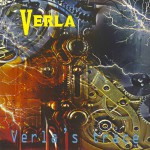 Verla
Verla
Verla’s Trace
Rasmussen Productions
Verla are Portland’s version of the Beach Boys. Not because they sound anything like the surfer guys, but in the fact that four of the members of the band are related. Lead singer Blair is the consummate frontman, looking like George Michael and sounding like Bono doing Michael Hutchence. Drummer John and bassist Fuzz blend like blood and keyboardist Pete provides the family color.
The boys are augmented by the crunchy guitar of Joel Mason and the lyrical, melodic guitar lines of Russian immigrant Dennis Leontyev. The sound calls to mind INXS and Portland’s own Nero’s Rome.
Check out the percolating commotion of “Morphine Drip.” John’s frenetically syncopated is matched by Pete’s thick piano chords, as Blair moans and cajoles the vocals. Cool. Leontyev’s crying guitar soars above Pete’s haunting key washes. as Blair intones Bowielike across the verses of “Calling,” a deeply emotional tune. A gorgeous mandala of echo-delayed guitars in the break swirl in ethereal majesty.
Dancing water guitars flow across the terrain of “Asphalt,” a moody rainstorm of a tune. The resultant effect is as a pool of tears puddled on the heart’s pavement. Sad and forlorn. Leontyev’s embroidered riffs skip around Pete’s synth oboe line on “Sunday’s Over.” Blair’s passionate vocal swims in the mix, while Fuzz punches out a sterling bass solo through the second verse.
“Moon Crazy” bubbles and boils with the guitars as Blair hovers in the cauldron. Tight harmonies heat up the mixture, melding the different musical elements. “Take Away My Eyes” is the studio version of the live track the band contributed to the upcoming Mt. Tabor live CD. Having just received advanced tracks of that live effort, I can now state unequivocally, that the recording will blow you away. Not a weak take among the nine tracks. Strong performances all around. A stellar recording job by Pete Plympton. Mt. Tabor Live will be a groundbreaking release in this city. Mark my words, it’s far and away the best live recording ever produced in Portland. Verla’s live version of “Take Away My Eyes” is more powerful, and the performance more energetic, as might be expected.
Verla are among a coterie of young bands who are presenting an alternative to alternative, whatever that might mean. They are a tight, focused band who deliver a cohesive sound that is musically sophisticated and emotionally vulnerable. When the fashion wheel of the music industry turns again (as it always does), don’t be surprised to see Verla on top someday. They are on a roll.
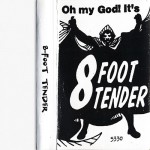 8-Foot Tender
8-Foot Tender
Oh My God, Its
Self-Produced
From the first track, “(Oh My God) I Love Rock,” to the last, “Angers Me,” 8 Foot Tender manifest the simple, propulsive brand of rock music that the Ramones first pioneered. It’s fun. It’s funny. It’s as infectious as the plague. Yeehoo!
Guitarist/vocalist combo Mike Moe and Jeff Fieldhouse prove themselves to be fiery, if somewhat limited guitarist on “I Love Rock,” a tune delivered with such over the top enthusiasm one wonders whether it is born of reverence or of sarcasm. Ramones?
Drummer Glen Brunton delivers a stuttering beat over the octave jumping rhino of Greg Odell’s bass on “Moe,” another pile driver of a cut. “Infraction” investigates the wholesale disassociation and disenfranchisement of a nation young men, while echoing the vocal call and response of “Hey Joe.”
“Givin’ Me A Reason” is actually a pretty straight ahead rocker of the Thin Lizzy variety. Kinda fun. And “Free Dog” could pass for a Dead Moon track. “Love Caper” and “”Think I’m Falling In Love” reveal the tender side of the 8-Footers. Well. about as tender as a meat grinder, but the word love is mentioned anyway. Check out the squirrely contortions of the lead guitar on “Love Caper.” Yikes! And “Angers Me” frets and foils, twisting upon a gnarled guitar figure.
8-Foot Tender don’t necessarily do anything special. Their ensemble playing is a little ragged at times. But the band deserves points for a sense of humor; and bonus points for a fairly high degree of songwriting craftsmanship. Sophisticated— they are not, but 8-Foot Tender are quite enjoyable, all the same.
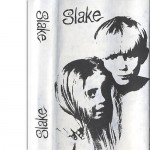 Slake
Slake
Slake
Self-Produced
Here’s another fine young band who deserve closer inspection. They too contributed a strong track to the upcoming Live At Mt. Tabor CD. This three-song recording highlights the band’s abundant talent. They sound a little Pearl Jammy on “Tractor,” although their sound is neither so dense, nor so gloomy. A memorable chorus acts as the center of gravity, while the droning verses provide a sense of calm before the storm of the chorus. An effective cut.
“Church Key” begins blustery, before becoming tranquil in the verses. Again, a well built chorus, driven by the droning engines of a guitar machine, barrels down the emotional highway; pulling to a near halt, before accelerating into the hairpin turns of the second half of the song.
Polyrhythmic interplay between bass and drums decorate “Shower,” with an ornate structure and hypnotic cadence. Another vital chorus paints the tune in rich contrasting colors. Purple and Orange. Red and green.
Slake are a fine young band. Their music is intelligently heartfelt. It creates an emotional impact on the listener. That alone is quite an achievement. That the band are technically proficient as musicians and insightfully sensitive as songwriters bodes well for them. Slake has a bright future, indeed.
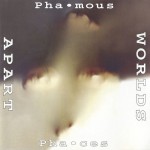 Phamous Phaces
Phamous Phaces
Worlds Apart
Self—Produced
Redolent of the Beatles and Cheap Trick, Eugenians Phamous Phaces present familiar tunes that are as hooky and poppy as they are anachronistic. “Ready 4 U” and “No Fool” sound like McCartney outtakes from the Help period. The intro to “I Want Her” mirrors the Who’s “Won’t Get Fooled Again,” before resolving into a sort of early 80s big beat sound. Vocalist Roger McConnell has a smooth assured voice, almost slick. His rhythm guitar work creates the foundation for Jesse Ruggles’ confident lead parts.
“Long To Hear The Words” cops the patented Byrds electric twelve-string milieu to good effect. Ron Petty’s solid drum substructure supports Ruggles’ snarling guitar in the Free/Bad Company sendup called “Little Miss Innocent.” Uncharacteristically, “Phat Azz” ( is it that people can’t spell? Or is Slade making a spiritual comeback?)rocks a little harder than its brethren legion creating for the Phaces a more contemporary sound a little funky, a little heavy.
Phamous Phaces are playing music that no one else seems much interested in playing anymore— pop songs, whose chief ambition is light entertainment rather than intense cerebration. For their fortitude, they are to be commended. For their musicianship, they deserve credit. For their name, they deserve a lipstick bullseye on the forehead.
